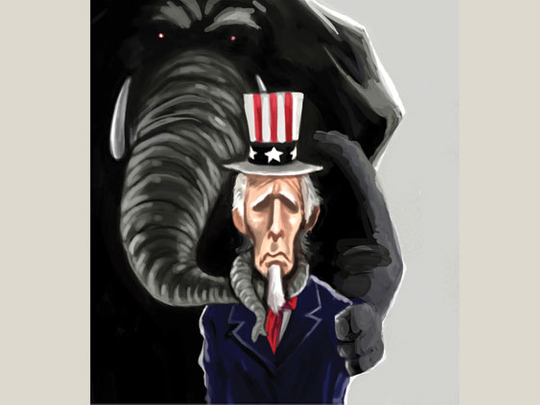
The American government reopened for business last week after a bruising 16 day-battle between Republican leaders and President Barack Obama. It reportedly cost the American economy $25 billion (Dh91.75 billion), and inflicted harm and hardship on millions of American people working for the government, or dependent on government programmes.
Democracy is about-among other things-the confrontation of ideas in the free marketplace without fear of rejection, or retribution. In the original Athenian model, the citizens (not everyone was a citizen) of the city-state gathered in large amphitheatres, and debated the issues of the day. It was a close application of democracy’s definition as government by the people for the people.
With the growth of the cities, it became impractical for all the citizens to gather in one place. Eventually, the direct democracy model gave way to representative democracy: Government by the representatives of the people for the people.
The problem with representative democracy lies in the distance — physical and intellectual —that separates the people from their representatives: How to ensure that the latter express and defend the interests of the people who elected them? And not, for interest the interests of pressure groups and lobbies, who finance the representatives election campaign.
This divided loyalty gives rise to an interesting dilemma: How to reconcile the values of democracy with the realities of politics, which, defined as a constant struggle for power, are ready to accommodate the less than democratic notions of deception,, lies, and the pursuit of power.
Consider the example of the showdown that led to the shutdown of the American government for 16 agonising days. “We fought the good fight. We just didn’t win,” Republican Speaker John Boehner said. The fight was far from good; it was thrust upon the Republican leadership by a vociferous minority from the far right recklessly subverting democracy, and showing contemptuous disregard for the economic and human cost of their myopic strategy.
What was it that was good about this absurd fight? Consider the relevant elements: President Obama and the Democratic law makers wanted the Congress to approve government spending, and the raising of the debt ceiling. The Republicans made their approval contingent upon rolling back, repelling, or defunding Obama’s signature legislature ‘The Affordable Healthcare Act’ (Obamacare).
This demand must have been formulated during a moment of collective amnesia, or at a moment of suspension of logic, and blind disregard for the democratic process. The democratic process offered the Republicans three distinct opportunities to challenge and defeat the Obamacare Act.
The Republicans availed themselves of all three opportunities, and lost. They tried to defeat the bill in Congress, and lost. When the bill became law, they challenged its constitutionality before the Supreme Court, and lost. In running for president for a second term, Obama defended the Affordable Care Act as a principal element of his campaign.
The Republicans challenged Obamacare, and presented their own version: the Romneycare (named after the Republican challenger), and lost, The American people re-elected Obama with a comfortable five million vote lead.
Having worked hard to ensure the success of his signature legislature against all challenges allowed by the democratic process, why did the Republicans assume that the president would yield to their extortionist methods — alien to democratic governance?
In times of crisis — and there is no doubt the US is going through several crises, including a crisis of governance — people feel divorced from their democratic institutions, and apathy and fragility come to characterise people and institutions.
One group of citizens usually stand to profit from such an environment: Demagogues. They play on peoples fears and on the fragility of their identifications with their institutions. They mount searing criticisms against their elected officials whom they accuse of incompetence and corruption. These demagogues claim to have the answer to the social and political ills that plague the country.
The fear of communism in the 1950s created fertile ground for rise of Joseph McCarthy, the senator who terrorised the nation with flimsy accusations about communist infiltrations of Hollywood and of the State Department .
The current crisis of governance led to the emergence of Senator Ted Cruz from Texas, who has been compared to Senator McCarthy: “Cruz…: has the same sneer and penchant for carelessness that McCarthy did, and the animal hunger for attention.” Cruz is already threatening another shutdown of the American government-no doubt using the same blackmail tactics to extort political concessions, he failed to obtain through the democratic process.
All democratically-minded citizens ought to actively oppose such subversion of democracy.
Adel Safty is distinguished visiting professor and special adviser to the rector at the Siberian Academy of Public Administration, Russia. His book, Might Over Right, is endorsed by Noam Chomsky.








